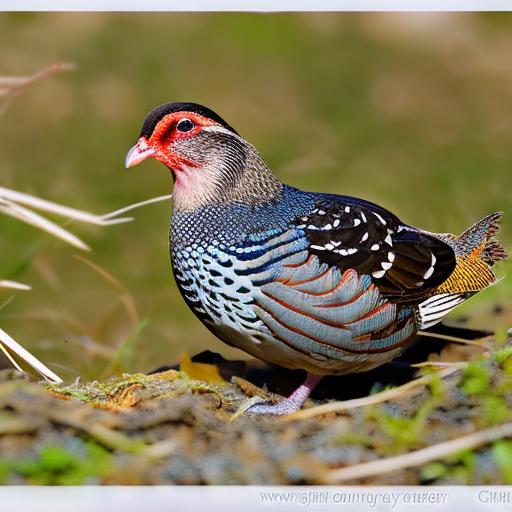Japanese quail, also known as Coturnix quail, are small birds that are native to East Asia. They are popular for their meat and eggs, and are often kept as pets or for commercial purposes. Chickens, on the other hand, are domesticated birds that are also kept for their meat and eggs. Both quail and chickens have their own unique characteristics and requirements, but they can be kept together in the same environment with proper planning and consideration.
Quail are known for their small size, gentle nature, and ability to lay eggs at a young age. They are also relatively quiet birds, making them suitable for urban environments where noise may be a concern. Chickens, on the other hand, come in a variety of breeds and sizes, and are known for their social nature and ability to forage for food. When kept together, quail and chickens can complement each other in terms of egg production and pest control. However, it is important to consider the specific needs of each species when planning to keep them together.
Key Takeaways
- Japanese quail and chickens have different housing and nutritional requirements
- Consider the space and housing needs of both species when keeping them together
- Provide separate areas for feeding and nesting to prevent competition and aggression
- Ensure a balanced diet for both quail and chickens to maintain their health
- Monitor for signs of disease and provide appropriate veterinary care when necessary
Considerations for Keeping Japanese Quail with Chickens
When considering keeping Japanese quail with chickens, there are several important factors to take into account. First and foremost, it is essential to consider the size and temperament of the birds. Quail are much smaller than chickens and may be at risk of being bullied or injured by larger birds. It is important to provide separate areas for the quail to retreat to if they feel threatened, such as low roosting areas or hiding spots. Additionally, it is important to consider the social dynamics of the birds. Chickens are highly social animals and may not readily accept the presence of quail in their environment. It is important to introduce the birds gradually and monitor their interactions to ensure that they are getting along well.
Another important consideration when keeping quail with chickens is the potential for disease transmission. Quail and chickens can carry different diseases and parasites, so it is important to keep their living areas clean and separate to prevent the spread of illness. Additionally, it is important to consider the nutritional needs of both species. Quail and chickens have different dietary requirements, so it is important to provide them with appropriate feed and supplements to ensure that they are getting the nutrients they need to thrive.
Housing and Space Requirements
When keeping Japanese quail with chickens, it is important to provide adequate housing and space for both species. Quail require a smaller amount of space compared to chickens, but it is still important to provide them with enough room to move around and engage in natural behaviors. A good rule of thumb is to provide at least 1 square foot of space per quail, and 4 square feet per chicken. It is also important to provide separate nesting areas for both species to lay their eggs, as well as roosting areas for the chickens and low hiding spots for the quail.
In terms of housing, it is important to provide a secure and predator-proof environment for both quail and chickens. This may include a coop or aviary with wire mesh walls and a solid roof to protect the birds from predators such as foxes, raccoons, and birds of prey. Additionally, it is important to provide adequate ventilation and natural light in the housing area to ensure that the birds are comfortable and healthy. It is also important to provide bedding material such as straw or wood shavings for the birds to nest in and keep warm.
Feeding and Nutrition
Feeding and nutrition are important considerations when keeping Japanese quail with chickens. Quail and chickens have different dietary requirements, so it is important to provide them with appropriate feed and supplements to ensure that they are getting the nutrients they need to thrive. Quail require a high-protein diet to support their egg production and growth, while chickens require a balanced diet that includes grains, seeds, fruits, vegetables, and protein sources such as insects or mealworms.
It is important to provide separate feeding areas for the quail and chickens to prevent competition for food. Additionally, it is important to provide access to clean water at all times for both species. It may be necessary to provide separate water sources for the quail and chickens, as quail may have difficulty accessing deeper water dishes designed for chickens. It is also important to provide access to grit or small stones for both species to aid in digestion.
Health and Disease Considerations
When keeping Japanese quail with chickens, it is important to consider the potential for disease transmission between the two species. Quail and chickens can carry different diseases and parasites, so it is important to keep their living areas clean and separate to prevent the spread of illness. It is also important to monitor the health of both species regularly and seek veterinary care if any signs of illness or injury are observed.
Additionally, it is important to provide both quail and chickens with appropriate vaccinations and preventative treatments to protect them from common diseases such as coccidiosis, Marek’s disease, and avian influenza. It is also important to practice good biosecurity measures when caring for both species, such as washing hands thoroughly between handling different birds, disinfecting equipment regularly, and preventing contact with wild birds or other potential sources of disease.
Behavioral Considerations

Quail and chickens have different behavioral characteristics that should be taken into consideration when keeping them together. Quail are known for their gentle nature and ability to lay eggs at a young age, while chickens are highly social animals that engage in complex social behaviors such as pecking order dynamics and communal nesting. When kept together, it is important to provide separate areas for the quail to retreat to if they feel threatened by the more assertive behavior of the chickens.
It is also important to consider the social dynamics of the birds when introducing them to each other. Chickens may not readily accept the presence of quail in their environment, so it is important to introduce the birds gradually and monitor their interactions to ensure that they are getting along well. Additionally, it is important to provide appropriate enrichment for both species, such as perches or hiding spots for the quail, and opportunities for dust bathing or foraging for the chickens.
Conclusion and Recommendations
In conclusion, keeping Japanese quail with chickens can be a rewarding experience when done with proper planning and consideration. It is important to provide adequate housing and space for both species, as well as appropriate feed and nutrition. Additionally, it is important to consider the potential for disease transmission between quail and chickens, as well as their different behavioral characteristics.
When keeping quail with chickens, it is important to monitor their interactions regularly and provide appropriate enrichment for both species. It may also be necessary to seek veterinary care if any signs of illness or injury are observed. Overall, with proper care and attention, quail and chickens can coexist in the same environment and complement each other in terms of egg production and pest control.
If you’re considering keeping Japanese quail with chickens, it’s important to understand the compatibility and potential challenges of housing these two species together. To gain a deeper insight into the dynamics of raising different poultry breeds, you may find the article on “When Do Guinea Fowl Lay Eggs” from Poultry Wizard particularly informative. This article discusses the breeding and behavior of guinea fowl, offering valuable insights that can be applied to understanding the dynamics of raising multiple poultry species together.
FAQs
Can Japanese quail be kept with chickens?
Yes, Japanese quail can be kept with chickens as long as certain considerations are taken into account.
What are the considerations for keeping Japanese quail with chickens?
It is important to provide separate housing for the quail and chickens to prevent any potential aggression or stress. Additionally, the quail and chickens should have access to separate feeding and watering areas to ensure they each receive the appropriate diet.
Do Japanese quail and chickens require the same type of feed?
No, Japanese quail and chickens have different dietary requirements. Quail require a higher protein content in their feed compared to chickens. It is important to provide each species with the appropriate feed to meet their nutritional needs.
Are there any health concerns when keeping Japanese quail with chickens?
There is a risk of disease transmission between quail and chickens, so it is important to monitor the health of both species and practice good biosecurity measures to prevent the spread of any potential illnesses.
Can Japanese quail and chickens coexist peacefully?
With proper housing and management, Japanese quail and chickens can coexist peacefully. However, it is important to monitor their interactions and be prepared to separate them if any aggression or stress is observed.
Meet Walter, the feathered-friend fanatic of Florida! Nestled in the sunshine state, Walter struts through life with his feathered companions, clucking his way to happiness. With a coop that’s fancier than a five-star hotel, he’s the Don Juan of the chicken world. When he’s not teaching his hens to do the cha-cha, you’ll find him in a heated debate with his prized rooster, Sir Clucks-a-Lot. Walter’s poultry passion is no yolk; he’s the sunny-side-up guy you never knew you needed in your flock of friends!







